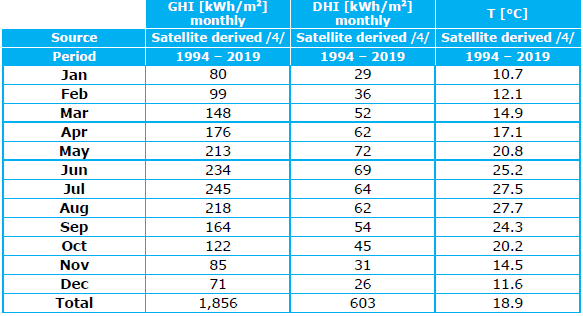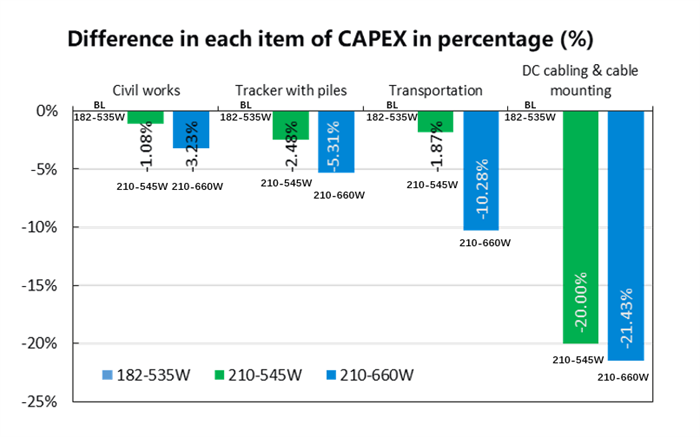The Way to Best LCOE (VI)
- 21/11/19
- Reliability
DNV, the world’s leading certification body in third-party activities, recently calculated the CAPEX and LCOE of Trina Solar’s 670W+ Vertex bifacial dual-glass modules (measured module power is 660W) plus TrinaTracker. The calculations show that Trina Solar’s Vertex 210mm bifacial dual-glass module can cut CAPEX by up to 1.2 €c/W and LCOE by 2.29% compared with the 182mm bifacial dual-glass module.
DNV, whose headquarters are in Oslo, Norway, is the world's leading independent assessment organization, with offices worldwide. As an international authority on assurance and risk management, DNV is renowned for its large database, world-leading digital solutions and objectivity.
Module types: 182-535W bifacial dual glass, 210-545W bifacial dual glass, 210-660W bifacial dual glass.
Method of installation: TrinaTracker – 1 P one-in-portrait single-axis tracking system
Inverter: String
Project location: Spain (figure below):

Project location
Monthly GHI&DHI data of project location:

Monthly GHI&DHI data
DNV calculated the CAPEX and LCOE of the above three modules with Trina Solar’s 1P tracker system based on fixed 100MW DC capacity, with the same DC/AC ratio. In terms of system design, the ground cover ratio (GCR) is fixed to ensure the consistent shadow occlusions on the bifacial module.
Such design aims to maintain control over the influence of external factors and system configuration on the same site, to objectively compare CAPEX and LCOE based on different modules. The comparisons of the BOS costs of the three modules are all based on local module costs, construction and installation, labor costs, grid interconnection fees, costs of operation and maintenance, land cost and financial cost, so that the calculation is consistent, complete and objective.
According to the design principle, the site system configuration and layout diagrams corresponding to the three modules are as follows:
Site system configuration:

Site system configuration
Project layout:

182-535W layout 210-545W layout 210-660W layout
Assessment results: 210 Vertex 660W reduces LCOE by 2.29% and CAPEX by 1.2 €c/W compared with 182-535W
Among Trina Solar’s Vertex 210mm bifacial dual-glass modules, both 545W modules and 660W modules have advantages over 182mm bifacial dual-glass 535W modules in terms of BOS savings and LCOE. According to the conditions of this case, it is estimated that compared with 182-535W, the CAPEX of the Vertex 660W modules can be reduced by about 1.2 €c/W (equivalent to RMB 9 c/W), and the LCOE can be reduced by 2.29%, indicating the optimal system value.


A detailed breakdown and comparison of CAPEX shows that the savings are mainly due to three aspects: electrical cables, tracker installation and transportation.
First, thanks to the innovative design of low voltage and high-string power, the 210mm modules have significant savings in the electrical part of the system. The 210mm modules featuring high-string power can significantly save cable length by 30% to 39%. Hence cable costs of 210mm-545W and 210mm-660W are both reduced by more than 20% compared with 182mm-535W.
On the tracker side, fewer modules help effectively reduce the materials of mounting and connecting parts such as purlins, thereby cutting tracker costs. Because of the innovative packaging design, container capacity can be increased by more than 10%, effectively reducing transportation costs and further reducing initial investment.
With superior power generation and robust reliability, Vertex is able to maximize value for customers by ensuring minimum LCOE during the system’s life cycle.

According to the results of the series of research and calculations completed by Fraunhofer and DNV, the 210mm (G12) modules represented by Trina Solar's Vertex series boast significant advantages in the electrical systems, transportation and tracker installation compared with the 182mm (M10) and 166mm (M6) modules.
The savings have been verified by calculations conducted in various application scenarios (TrinaTracker 1P, TrinaTracker 2P, trackers with fixed tilts) in various project locations (Spain, the United States and Japan), and recognized by many developers, design institutes, research institutions.
Click on the links below to access these results, which were previously reported in our “The Way to Best LCOE” series:
The Way to Best LCOE (I)
http://www.dgfurong168.com/en-apac/resources/blog/mon-12142020-1734
The Way to Best LCOE (II)
http://www.dgfurong168.com/en-apac/resources/blog/thu-01282021-1319
The Way to Best LCOE (III)
http://www.dgfurong168.com/en-apac/resources/blog/tue-03092021-1759
The Way to Best LCOE (IV)
http://www.dgfurong168.com/en-apac/resources/blog/thu-09162021-2216
The Way to Best LCOE (V)
http://www.dgfurong168.com/en-apac/resources/blog/tue-09282021-1536
For more information about the assessment report on Trina Solar’s Vertex modules, please contact Trina Solar’s local sales representatives. And please follow “The Way to Best LCOE” series.
Mail to: VertexValue@dgfurong168.com
Relevant Topics
Smart Energy Solutions
delivered straight to your inbox

More Events

